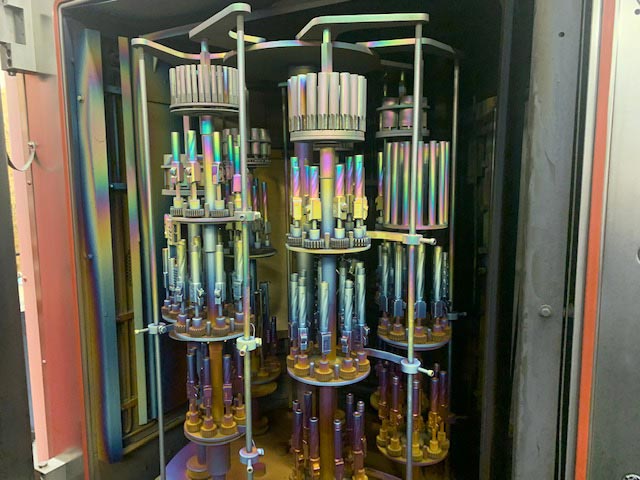| |
COATING APPLICATIONS
Physical vapor deposition involves:
•
Creation of reactive spices such as atoms, activated atoms, ions and energized
species.
• Transport
of these reactive species to substrate with or without plasma environment.
• Reaction of two or more atoms orions to create a compound which
will deposit on the substrate as coating.
• Nucleation growth and deposition on the substrate as protective
coating.
In general,
the most PVD technologies utilizes plasma in the deposition technology
as the most important tool to control coating properties. Future application
industry may be limit to mankind imagination. The coating materials may
be pure metals, alloys, ceramic or composites. Plasma assisted PVD technology
has provided unique opportunity to scientist to engineer to fabricate
many complex designed coating which will provide multiple solutions in
the various fields of Aerospace applications and Energy and Power environments.
It is therefore, not an exaggeration to state that plasma assisted physical
vapor deposition technologies has become "Solutions in search
of a problem".
It is important to mention the Plasma Coating Technologies, Inc.
provides everyday applications coatings used in cutting tools, aerospace,
medical components, automobile, energy and power; however, PCT, Inc. also
takes individual customer specialized coating needs and develop Customized
Engineered Coating to find the Coating Solutions. This could
be a short-term project for by 2-4 months or long term 3-6 months’
time scale. Finally, Kamleshwar Upadhya President of Plasma Coating
Technologies, Inc. has developed many highly Innovative Technologies
Coating for aerospace and automobile industries and obtained USA patents
which has been assigned to PCT, Inc. One of such coating is multi-layered
nano-grains nano-layered ceramic composite coating for aircraft engine
compressor blade applications. This multilayered nano-tech coating
is extremely beneficial against airborne particle impact and also provides
many folds increased erosion and corrosion resistance. The PVD ceramic
coating possesses 10-12-micron in thickness and does not change either
dimension or weight of the compressor blade and thus Aerodynamic Efficiency
of the engine. It increases erosion and corrosion resistance by 4-5 times
in comparison to uncoated blades and reduce the fuel consumption by 2
to 3 percent. Interested companies are invited to obtain further technical
details on this coating. MDS Corporation and Delta Airline are using TiN
based PVD coating on compressor blade and military Helicopter Air foil
blade for the last two years successfully.
In the interest of customers, a brief background of Plasma state and role
of plasma in plasma assisted PVD is describe here. This will make easier
for customers to understand why plasma provides much enhanced physical
and mechanical properties of PAPVD coatings.
In the era of current high technology, the tendency to use a Composite
Material where the surface. Physical and mechanical properties are different
of those of bulk material is becoming increasing essential. Recently
plasma assisted PVD is providing the needed technology to fulfill the
needs of Aerospace, Medical and Automotive industries for depositing Composite
Coating. Plasma is generally called fourth state of matter
and consists of activated, ionized and highly energized atoms, ions and
gaseous spices. Plasma contains ions and electrons in equal numbers; therefore,
it is electrical neutral. In plasma ionized vapor species have greater
reactivity and also can be accelerated in the
electrical field. This combination of the two properties
will provide a coating with much better physical and chemical properties;
therefore, the main theme for developing a powerful and efficient coating
process is clear: Ionized the coating species and transport them to
the surface to be modified and coated in an electric field (Plasma system)
which is The PAPVD Coating Deposition Process.

|
|
|
|















